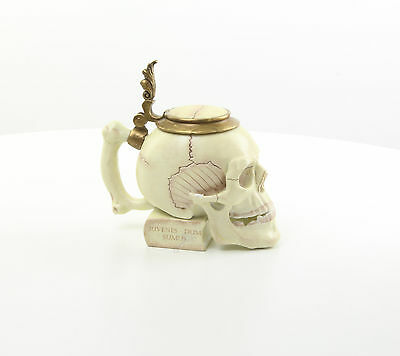-40%
Skull Drinking Vessel Porcelain Bronze Jug Mug Students Fellows Shank
$ 121.08
- Description
- Size Guide
Description
Skull drinking vessel porcelain / bronze jug mug skeleton bones (iuvenes dum sumus, gaudeamus igitur) student association songDecorative object made of fine porcelain and bronze lid
Newly manufactured true to detail according to old templates.
Height: 19.5cm Width: 11cm Length: 20cm
Weight: 1.5kg
Gaudeamus igitur (Latin for 'So let's be happy!'), Also known as De brevitate vitae (lat. for 'On the Briefness of Life'), is a student song with Latin text and is considered the most famous traditional student song in the world. [1] It is known in many European countries, in the Anglo-Saxon world, as well as in parts of Asia and Latin America. There are often translations into the respective national languages. Since the 18th In the 19th century there were also various German-language versions. The first text traces of this song can be found in the Middle Ages. Edited literarily by Christian Wilhelm Kindleben, the text appears in the first printed student songbook from 1781 [2]. Century became a prominent part of student songbooks in the German-speaking area, but also in other countries. The melody appeared in print for the first time in 1788 and has since been firmly linked to the text Gaudeamus igitur. Text and melody now form a unit and enjoy high esteem in academic circles in many countries around the world. When Johannes Brahms was awarded an honorary doctorate from the University of Breslau in 1879, he thanked him with the Academic Festival Overture, at the end of which he played the Gaudeamus igitur in the large orchestra.
Gaudeamus igitur (Latin for 'So let's be happy!'), Also known as De brevitate vitae (lat. for 'On the Briefness of Life'), is a student song with Latin text and is considered the most famous traditional student song in the world. [1] It is known in many European countries, in the Anglo-Saxon world, as well as in parts of Asia and Latin America. There are often translations into the respective national languages. Since the 18th In the 19th century there were also various German-language versions. The first text traces of this song can be found in the Middle Ages. Edited literarily by Christian Wilhelm Kindleben, the text appears in the first printed student songbook from 1781 [2]. Century became a prominent part of student songbooks in the German-speaking area, but also in other countries.
















